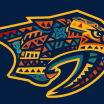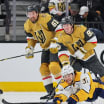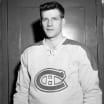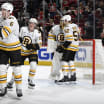Legendary hockey reporter Stan Fischler writes a weekly scrapbook for NHL.com. Fischler, known as "The Hockey Maven," shares his humor and insight with readers each Wednesday.
This week he delivers a popular segment, "Voices From The Past," featuring Hockey Hall of Fame goalie Bill Durnan, regarded by many as the greatest goalie of his era (1943-50). Stan interviewed Durnan in 1969 at his Toronto apartment. The six-time Vezina Trophy winner and two-time Stanley Cup champion with the Montreal Canadiens had hoped to play for the hometown Maple Leafs but was rejected and never forgave Toronto management. Durnan describes the trail of obstacles he had to overcome to become a Hall of Famer.
Voices from the Past: Bill Durnan
Goalie earned induction into Hall of Fame despite late start to NHL career
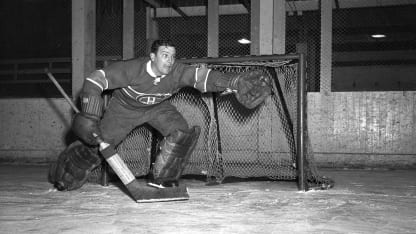
By
Stan Fischler
Special to NHL.com
What hardships did you overcome before playing competitive hockey?
"Growing up in Toronto, I knew what hard times were all about. My mother died when I was 5 years old, and my dad didn't have much money. We had to scrape to make ends meet, and that included getting hockey equipment. When I was 9. my father saved his pennies and bought me a second-hand pair of skates for $1.50. They were about four sizes too big, which limited my skating ability. I wound up in the nets because I was the poorest skater in our group. When I learned to skate better, they kept me in goal because by then I had become a big kid and there was a lot of me to fill the net. I stayed a goalie forever and never regretted it."
When did you start thinking about hockey as a career?
"I didn't. These were the 'Dirty Thirties.' The Great Depression. The big thing was making some money so we could eat. My father had gone through hell after my mother died, and the whole experience made quite an impression on me. With my older brother and myself, dad moved from boarding house to boarding house. While he worked, we went to school. When I came home, I cooked dinner for him and squeezed in hockey whenever I had free time.
When did you get serious about hockey?
"I was playing well enough for Westmoreland that I finally got noticed. One club that liked my style was the North Toronto Juniors. It turned out that this was one of those minor farm teams of the Toronto Maple Leafs. This was the 1931-32 season and, frankly, we were just a bunch of kids off the street who played for the fun of it. But we did make the first round of the playoffs, and that caught the eye of a few hockey people. Red Burnett, hockey writer for the Toronto Star, thought I had potential and recommended me to the coach of the Sudbury Wolves, a junior team in Northern Ontario. The Wolves invited me up and in my first year there, 1932-33, I began thinking that maybe goaltending could be my career. I became good enough so that the Maple Leafs signed an agreement with me and invited me to camp that fall. I was very hopeful."
What stopped you?
"A wrestling match. During the summer I spent a week at Wasaga Beach with a buddy of mine. As luck would have it, we started wrestling and I wound up ripping my knee very badly. When the Maple Leafs found out about it, they dropped me. I was disillusioned and figured if that was the kind of treatment I was to get, then I didn't want any part of it. I was hurt mentally as well as physically and quit altogether. Playing in the NHL was about as far from my mind as swimming on Mars."
How did you bounce back?
"Gold had been discovered in the northern Ontario town of Kirkland Lake. By the 1930s, seven mines were operating -- and they all sponsored sports teams, including softball. As it happened, I was a very good softball pitcher, and the Lake Shore Mine had heard that I was doing some good pitching in the Toronto Beaches League. I got invited to pitch for Lake Shore's softball team, then wound up playing goal for their hockey club. Kirkland Lake was a terrific hockey town, so I could play hockey and earn some money at the mine. Lake Shore's team played in the mine leagues -- and believe me, this was intense stuff."
What was hockey like there?
"It was huge. For me to play goal for the Lake Shore Blue Devils turned out to be a career-turner, because we had developed such a good team in the late 1930s. We got more and more attention in the 1939-40 season because we won the Allan Cup as the top senior men's team in the country. After my four years with the Blue Devils, I moved down to Montreal and got a job in the accounting department of Canadian Car and Foundry Company. Money wasn't a problem for me anymore, and I got a break because my boss, Len Peto, was a director of the Canadiens. Plus, he helped turn my life around as well."
How did Peto change your life?
"The Canadiens had a farm team, the Montreal Royals, in the Quebec League. I started playing for them in 1940-41 and for four years I was goaltending at the Forum, the same arena that the Canadiens called home. Not that I had a second thought about the NHL. That bad incident with the Maple Leafs was still sharp in my mind, and I never wanted to go pro. I had a good job and was making a little extra from the Royals. Everything was just fine until Peto started pressuring me to sign with the Canadiens. This was in October 1943, when I was 29, not exactly young for a goalie."
What altered your thinking about a pro career?
"It was wartime and the Canadiens were desperate for a goalie in the 1943-44 season. They kept pushing me to sign, and I resisted at first. Somehow I managed to hold out until the day of the season opener at the Forum. I finally got the Canadiens management to give in to my wishes. I signed for the huge sum of $4,200 and found myself on a hockey team beginning to jell.
Rocket Richard
was just starting to show his stuff and my new coach, Dick Irvin, put him on a line with
Elmer Lach
at center and
Toe Blake
on the left side. Eventually, it was nicknamed the 'Punch Line' and became one of the best units in the NHL."
What was so special about Richard?
"He would get that puck at the blue line and go. From my vantage point in the crease, I could hear the crowd at the Forum react to him better than the guys who were skating. Starting at a low hum, the crowd noise would grow. And if Rocket scored a goal, the roof came down. He rarely scored a scrabby goal. His goals] were things of beauty, and in the last years of Lach and Blake it was Maurice who kept them in the League. Blake kept saying, 'Geez, I hope Rocket keeps putting them in the net 'cause I'll be here 'til I'm 50.'"
**The Forum fans were tough on you at times, weren't they?**
"For sure. Fans are fickle and funny. Nobody knows that better than me because I had my troubles with them in Montreal. I'd played for six seasons with the Canadiens and won the Vezina Trophy in five of them, but the fans weren't always satisfied. They felt we should win every single game. Once we were in a slump in 1947 and the Forum people started chanting, 'We want Bibeault! We want Bibeault!' They were asking for
[Paul Bibeault
, who had played some goal for the Canadiens before me. They booed me; made me feel six inches high. About 13,000 people were calling me the same bad names at the same time. But I didn't quit and I did come back. Looking backward, I realize that the fans pay their money and have a right to boo, but it was hard for me to take. When I got depressed over stuff like that, Irvin would work on me."
What did Irvin do to soothe your anxiety?
"Like myself, Dick loved baseball. Whenever we'd go on a road trip, Dick would make a point of visiting the ballpark in whatever city we happened to play. He'd go out to see the empty field,just for the chance to look at a major league ballpark. Then he'd tell me about all the big-league players he'd met, guys like the Cooper Brothers, Mort (a pitcher) and Walker (a catcher), from the St. Louis Cardinals. Dick would recall the conversations with them. 'When you get a nine-run lead, do you ease up?' he'd ask Mort Cooper. The answer would be in the form of a pep talk. 'No, sir,' Cooper would say. 'You must keep throwin' the ball 'cause if you ease up and they get to you, you ain't gonna get started again. You just keep bearin' down.'"
Who gave you grief among the Canadiens management?
"I certainly wasn't crazy about Tommy Gorman when he was general
, in the system. I told Irvin to let the kid finish the series. Gerry won the
fourth game
, but the Rangers came back in the
next one
to take the series. And that was it for Bill Durnan."
Any regrets?
"Frankly, I'm glad I went out when I did. No question I did the right thing from the viewpoint of playing hockey. It reminds me of one evening long after I had retired. I was at a party and
John Ferguson
, the tough guy with Montreal, was there. Somebody asked him why he's such a stinker on the ice and such a nice guy off of it. 'When I'm on the ice, I'm at work,' Fergie replied. I liked that a lot, because I knew that that's the kind of answer we old-timers would have given!"

